“Come on, China!”
Spectators holler as China battles Norway, erupting into applause whenever a player makes a killer move. State-of-the-art cameras record the action, then blast it onto massive screens throughout the stadium. Fangirls wear electronic headbands flashing the names of their favorite players, giggling and covering their faces whenever the cameras zoom in on them. Throngs of teens line up to buy official Team China jerseys; others are already wearing them.

Team merchandise for sale at an esports tournament (photo by Jimmy Mi)
It’s the second day of Shanghai’s Overwatch World Cup qualifier. Developed and released by American video game company Blizzard Entertainment, Overwatch is a team-based shooter game that boasts 30 million players worldwide, a base it has grown in barely a year.
The tournament draws a cast of characters from around the world – both onscreen and off. Aside from the players and teams, there are coaches, presenters, broadcasters, sponsors and viewers (millions of whom are watching online via live-streaming platforms like Amazon’s Twitch). Both American and Chinese commentators narrate the action. It’s an enormous operation.
The players look like typical teenagers – except they wear serious facial expressions, which we see close up on a secondary set of screens projecting as they play. But the biggest screens hang above them, showing the players as their virtual selves – Overwatch game characters battling each another in fantastical settings.
Team China and Team France top the day’s competitions and qualify for the next stage of the World Cup. But every team that places in Shanghai this weekend receives USD9,000. Do the math, and that’s over RMB10,000 per player. Not bad for a weekend of gaming.

An esports tournament held in Shenzhen (photo by Jocelyn Richards)

A fan girl wears the name of her favorite player on her headband at Shanghai's Overwatch World Cup qualifier (photo by Jimmy Mi)
Welcome to the world of esports, where professional gamers compete in multiplayer videogames in front of a live audience. Esports has transformed a onetime slacker pursuit into an industry worth millions of dollars.
The idea of ‘professional video gaming’ may have seemed laughable a decade ago. But today, the esports industry is booming. Global revenue reached USD493 million in 2016 and is expected to reach a staggering USD1.5 billion by 2020, according to a market report by gaming researcher Newzoo. Players compete in tournaments around the world, join clubs and train daily.
But nowhere is taking esports more seriously than China, the largest market in the world for video games. China has more than 70 million esports enthusiasts (viewers who watch esports multiple times a month) – more than triple the US’s 20 million, according to Newzoo. Meanwhile, the number of esports players (both recreational and professional) in China is a colossal 117 million, according to consultancy group iResearch.
In 2016, half of the 10 highest-earning esports players in the world were Chinese. And while the US and South Korea once ruled the esports scene – both were at the top of the tournament winnings table until 2011, and, in the case of South Korea, until 2014 – China now currently dominates the board.
The country’s esports supremacy is no coincidence. According to Beijing-based game developer Chris Pfeiffer, the reason is twofold: accessibility and big business. Games in China are generally free to play, meaning that instead of paying upfront to buy a game like in the West, users can download it for nothing.
And then, there’s Tencent.
“Tencent is massive,” says Pfeiffer, who has worked in the gaming industry professionally since 1995 (and “not-professionally since the mid-80s”). The Internet giant owns WeChat, game distributor WeGame and game-streaming service Douyu. It also owns Riot Games, which developed League of Legends – currently the most-played esport in the world.
“If [your company] is big in China, that instantly gives you one-fifth of the world. You’re big in Korea? Meh, that’s like being big in Chongqing,” Pfeiffer laughs.
But big companies aren’t the only ones making money off esports in China – the players themselves are, too. One way to game a paycheck? Tournaments.
Shenzhen Bay Sports Center is a 33,000-seat stadium used mostly for swimming and football. But on one day in June, it hosts the National Electronic Sports Open (NESO) warm-up competition.
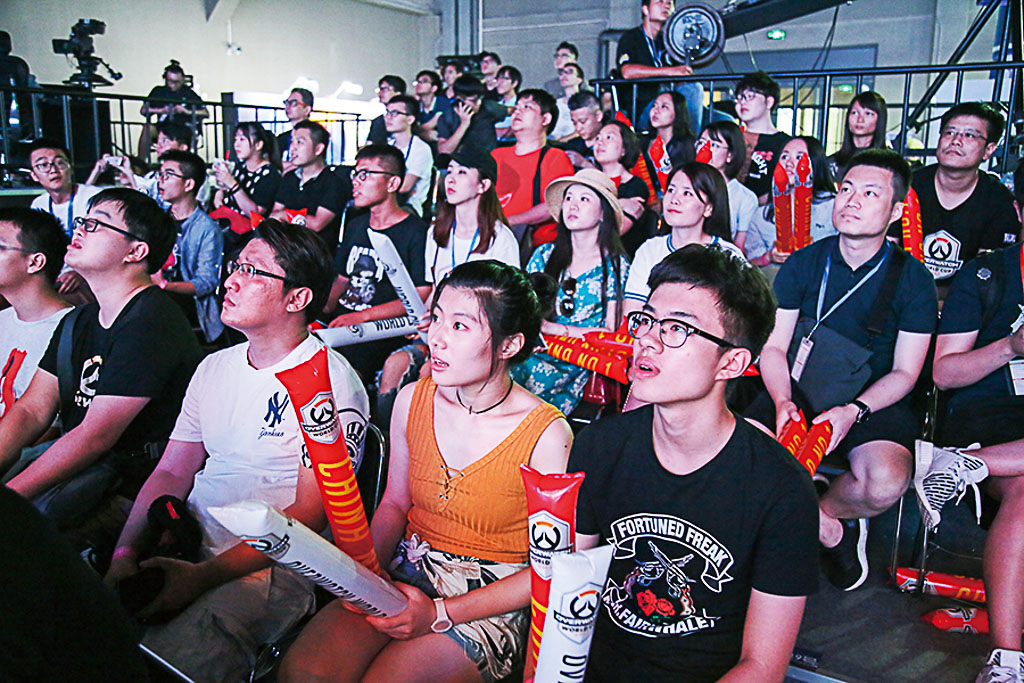


Esports spectators watch a live game (photo by Jimmy Mi)
It’s here we meet 23-year-old Theeban Siva, who’s been competing professionally for the past seven years. Better known by his on-screen names 1437 and Rose, Siva is part of TNC Pro Team, an esports team sponsored by a Philippine Internet cafe chain. Siva spent a year in China playing for a team called LGD Gaming back in 2012, but says he “[felt] out of place constantly. You get burned out really quickly.”
The Canadian native has been recruited by so many teams throughout his career, he’s finding it hard to keep track (he joined TNC Pro Team earlier this year, his seventh team in just two years). When asked where he is based in the Philippines, he shouts across the room to his manager: “Hey, we live in Manila, right?” (Yes, they live in Manila.)
“Well,” Siva says apologetically, “I’ve only been with the team for three weeks.” Siva’s indifference to geography belies his position on the team: captain.
Eight teams participate in the NESO warm up: three from China, two each from the Philippines and North America, and one from Europe (Greece). Spectators are mostly young men in their 20s and 30s – with the occasional girlfriend checking her phone – and a few hardcore female gamers. The stands seem a little empty, though our tour guide ensures us that “it’ll fill up later on – Chinese people don’t like to arrive early.”
A glittering trophy sits between the two teams during play. The atmosphere is tense, but Chinese team Newbee, who are about to enter their third game, seem pretty relaxed. One team member is even yawning. The team goes on to win three-nil, and later ends up blitzing the entire tournament.

Team Newbee prepares to enter the stage (photo by Jocelyn Richards)

Team Newbee battles it out in a game of Dota 2 (photo by Jocelyn Richards)
After fending off Newbee’s rabid fans – one asks for a signature from the MVP – we catch up with team member Damian “kpii” Chok.
“It’s amazing,” he says. “Our team is known for getting second place all the time, and now finally we’ve [won] something.”

Team Newbee player Song Chun is awarded MVP of the NESO tournament (photo by Jocelyn Richards)
Originally from Australia, Chok moved to China to play Dota 2 (the country is one of the best in the world at the game, and as Siva tells That’s: “Dota has the most prize money”).
Esports in China is like a professional sport, Chok says. “In Australia it’s just a game.”
Chok’s daily ‘professional life’ is strenuous, though it may sound like leisure to some. “We’re pretty much in a house every day and just play games. We practice six to eight hours a day, seven days a week,” he says, adding that the team “occasionally have a day off and go for food and a movie, or whatever, but usually, it’s just staying in the house.” Chok say’s he’s “living the dream.”
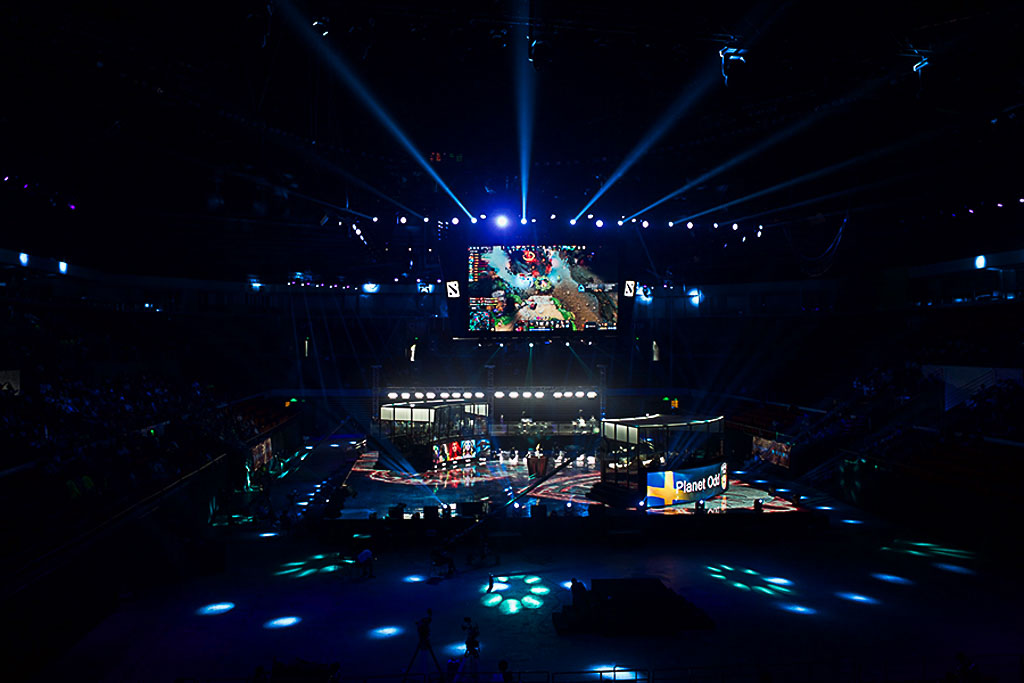

The esports stage from below (photo by Jocelyn Richards)
Not all talented esports players follow the professional road. Semi-pro Li “zipninja” Jun plays esports on the live-streaming site Huomao. “I play attacking games like Street Fighter,” the 33-year-old tells us over coffee in Beijing. “These kinds of games haven’t reached maturity in China. I want to help increase their popularity here, so I signed a contract [with Huomao].”
Live-streaming is a popular way for esports players to earn money, as the last couple of years have seen a proliferation of live-streaming sites in China. People game in real time for real audiences and in exchange for real cash, and streaming platforms offer lucrative contracts when they believe a player will draw traffic to their site.
Li says his Huomao contract forbids hims him from revealing his salary, but he says it is “stable” and that he’s content with his status as a semi-pro. “If you’re a pro player, many things influence whether you succeed or not. The nature of gaming is cruel. One or two minutes can determine the result of a tournament, which could determine your whole career.”
Li travels regularly to compete. At last year’s Evolution tournament in Las Vegas he placed 256 out of 5,000, he tells That’s Beijing. “I like the attention and satisfaction of competing in tournaments.”
Fame and fortune also drew gamer Xiao Zhao to the industry. She regularly attends tournaments both here and elsewhere in China, telling us: “I love having a lot of fans.” Zhao worked in a bank for four years before being approached to work as a producer at Panda TV, an esports live-streaming service founded by Wang Sicong, the son of one of China’s richest men, Dalian Wanda Group founder Wang Jianlin.

Team China competes at the Overwatch World Cup qualifier in China (photo by Jimmy Mi)
“It’s rare to see a girl at this level,” Zhao says. “The guy gamers feel protective towards me. Even though I see more pro female esports players in the future, I don’t think people’s attitudes will change. People will probably always view girls who game as exceptionally cool, badass people.”
Zhao describes a competition in her home city of Nanning. “It was a big deal – from locals to regionals and nationals. I became the first female player ever to get into the finals,” she says proudly. “This gave me a lot of attention and helped build up my fanbase. It [also] increased awareness of female gamers in the professional industry.”
The esports industry is overwhelmingly male-dominated. Of the few female esports players who do compete, the ones abroad generally perform better than their Chinese counterparts (no Chinese player made last year’s female top 10 esports earnings list). Yet according to a 2017 report by Newzoo, across the 13 countries surveyed, 46 percent of gamers are women. So it’s not that women aren’t playing games; they just aren’t competing on the same professional level.
Zhao attributes this discrepancy to players’ objectives. “There are a lot of female gamers in the industry – especially League of Legends – but instead of trying to become a serious pro gamer, they’re just in the business for live-streaming. They may be beautiful or sing really well. Rich guys give them [monetary] ‘gifts’ [on streaming websites]. They’re not necessarily gaming because they like it.”
Another reason may be societal expectations. “Parents don’t think girls should play. Girls are expected to be docile.
“Older people think that playing games negatively impacts studies or sleep and health. When I was little I’d go into the electronics store and my dad would say, ‘If you come in here again, I’ll break your leg!’" she chuckles.
For many parents of young gamers, China’s obsession with esports is no laughing matter. The nation is infamous for its Internet addiction camps, where worried parents send their kids, sometimes for months on end, in the hopes of “rehabilitation.” Known for their harsh environment, military-style discipline and even electric shock therapy, the camps are less retreat, more bootcamp. The consequences can be deadly. Last year, a 16-year-old Chinese girl killed her mother after being sent to an Internet addiction bootcamp, claiming she had been beaten and abused at the center. Earlier this year, the Chinese government drafted a cyberprotection law that hopes to protect camp attendees from such abuse.

Esports players in action
Due to fear of their negative effect on children, video game consoles were officially banned in China between 2000 and 2015. Firms such as Microsoft and Sony were prohibited from making and selling their gaming consoles anywhere in the country (though a gray market existed in many Chinese cities).
Despite lifting the console ban, the State General Administration of Press and Publication still occasionally prohibits games from the mainland, including shooter game Battlefield 4 for “endangering national security” and World War II-themed Hearts of Iron for “distorting history.” In July, the state-run People’s Daily lambasted Tencent’s mega-popular mobile game Honor of Kings, for its “negative energy.” Following this criticism, Tencent’s share price plunged and the company began limiting the amount of time children could play the game.
But Chinese views towards gaming are changing. Zhao’s own parents eventually came to accept her passion: “[My parents were unsure] because I am a girl, and gaming was seen as financially unstable. But they became especially supportive after I hosted a competition in Guangdong. They realized that gaming could be very serious and professional.”
Semi-pro Li tells us his family also changed their attitudes – after he proved that he was doing well. “They only accept it if you are playing to get some tangible benefit and not wasting time,” he says.

Game developer Chris Pfeiffer at his office in Beijing
Authorities may be softening their anti-esports stance as well. The Communication University of China (CUC), a public university that is administered by the Ministry of Education, is the first university in China to introduce an undergraduate esports major, which will be offered to students from the beginning of this school year.
“It’s actually called ‘Digital Entertainment,’” a CUC staff member tells us during a visit to the campus in east Beijing. The staff member, who asks to remain anonymous, teaches in the same department as the new major. “The name ‘esports’ is too broad – [CUC’s] major covers esports organization, broadcasting, esports event management and the fan economy.”
“We expect the program to contribute to the [esports] industry through our students’ expertise in the planning, management and design of games,” she says.
Though China’s Ministry of Education approved the major, the professor says it’s an industry-led effort. Of the 20 students that will graduate from CUC’s ‘Digital Entertainment’ program each year, 10 will have the opportunity to work at Hero Entertainment, the program’s official partner. “The company has had some difficulties in esports media – no one knows what to do. They have a lot of people from elsewhere in TV or media but no one [has specialized in esports].”
Local governments show more direct support for the esports industry. Take Yinchuan, a prefecture-level city located in Ningxia Hui Autonomous Region in central China, for example. Each year the city hosts the grand finals of World Cyber Arena (WCA), the world’s biggest “third-party” (unrelated to the game developer) esports tournament. Based in China since 2014, WCA live-streams matches that take place around the world to screens in equally diverse places.
On a visit to the company’s Beijing office, it’s two minutes until show time. In the production room, we meet a handful of producers lounging in chairs in front of a wall of monitors. The sceens display scenes from a live Dota 2 game and two hosts (who happen to be sitting in front of a green screen in the room next door). “We’re on in one, two, three,…” a producer says. The hosts begin chatting animatedly and we are quickly shuffled out of the room.
Inside the office of WCA’s deputy general manager Li Yanfei (no relation to Li Jun), we’re told that WCA’s Yinchuan tournament is sponsored by the local government.
“They fund our activities partly because of policies, such as ‘One Belt, One Road,’ that are aimed at attracting industry to the region,” Li Yanfei explains. “As Yinchuan is out west, rather than east, the local government is keen to attract people to the area. Aside from that, esports attracts social media platforms and big tech companies. [The local government] hopes these industries will gravitate to the area.”
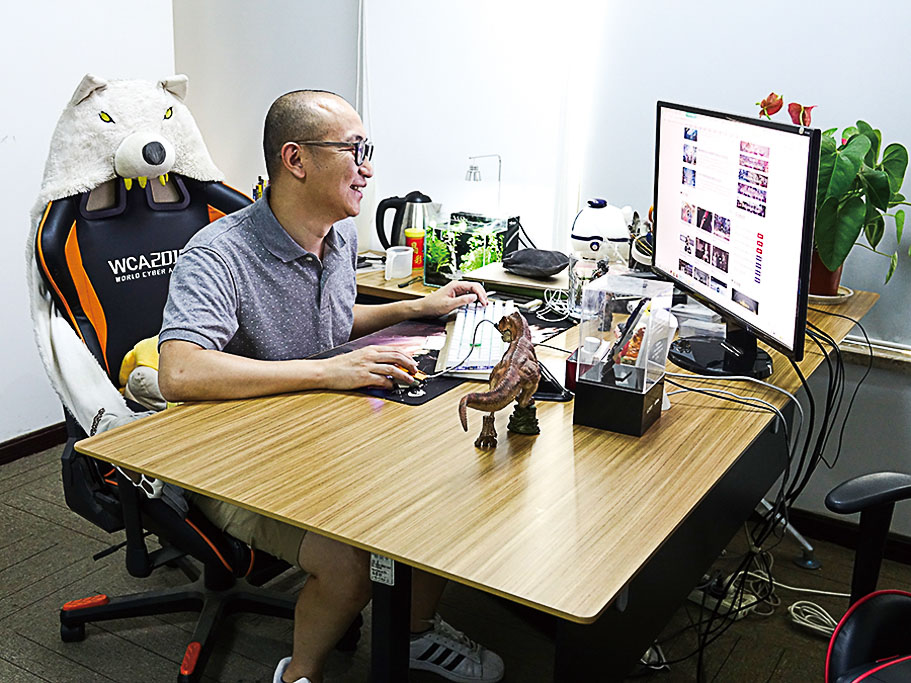
World Cyber Arena deputy general manager Li Yanfei (photos by Dominique Wong)
WCA is also focused on educating young people about esports, and have partnered up with an education group to provide esports-related materials and exams for students wanting to work in the industry.
Opportunities in China’s esports industry may seem limitless. But, while the industry insiders we talk to are adamant it will supplant traditional sports in the future, they express trepidation about the path they’re taking to get there. Question marks over the industry’s infrastructure, or lack thereof, remain.
Activision Blizzard, the parent company of Blizzard Entertainment, is hoping to address this. The company recently announced plans to create a professional Overwatch league based on intercity rivalries. Many in the industry are calling it a potential game-changer, and the company has already sold franchise teams to owners in Seoul, Los Angeles and New York. Buyers include powerful sporting identities such as Robert Kraft, the owner of the New England Patriots, an American football team, and Jeff Wilpon, the chief operating officer of the New York Mets baseball team.
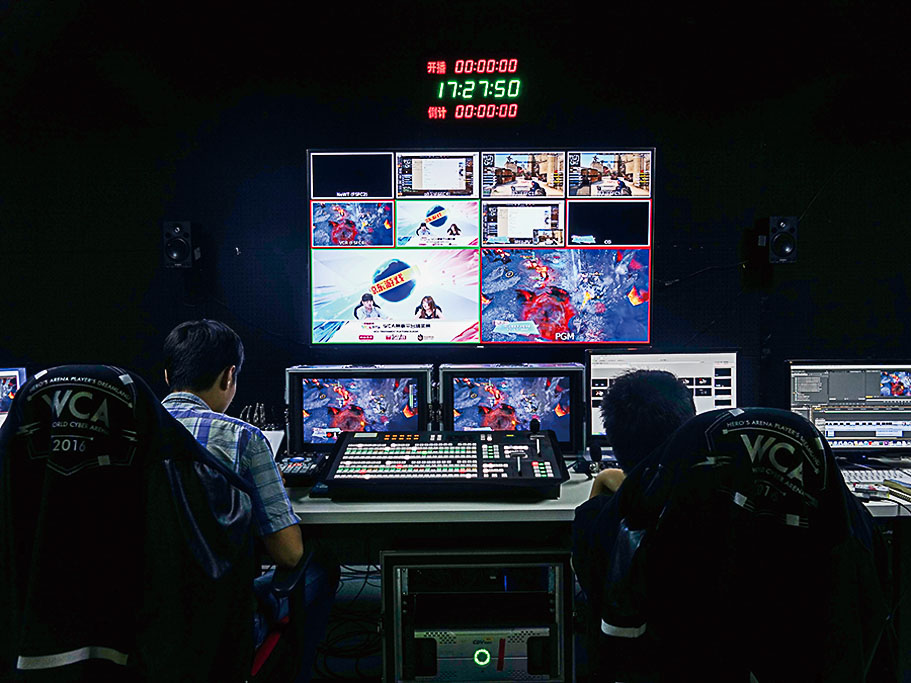
Inside a live esports broadcasting room at WCA (photo by Dominique Wong)
The franchise model is similar to that of traditional sports, and as senior director of esports Lawrence Chi says Blizzard hopes to blur the distinction between the two even further. As he tells That’s Beijing: “A lot of [our model] will be taking a page from other sports: recap shows, debate shows, [and] if there’s some drama, let’s roll with it. Let’s get the fans involved and tell these stories.”
Meanwhile, despite lacking the same resources as companies like Activision Blizzard, grassroots esports communities are gaining momentum.

Game developer Blizzard Entertainment’s logo is displayed prominently on stage (photo by Jimmy Mi)
In Beijing, esports group BiB Community hosts a monthly amateur Street Fighter tournament at Paddy O’Sheas. The Irish pub, one of the most popular sports bars in the city, has broadened its programming to include esports alongside a traditional roster of rugby and football.
The tournament attracts a diverse bunch of people from both local and afar. Huddled around monitors underneath a big-screen projector, players compete amid a whirlwind of flashy digital animation. Behind the main group, curious bar patrons turn into accidental esports spectators.
“LJ, you’re a legend!” someone says, half-exasperatedly, half-admirably, as Li Jun eviscerates his opponent.
Co-organizer of the event Rick Liu hopes to turn BiB Community into a proper company. Things are looking good: they’re already in talks with sponsors and a live-streaming site. But, in the esports industry, one can never be sure. Companies take off, making millions – or they implode. Whatever happens, Liu and co. will keep at it.
“Playing games gets you a lot of friends,” Liu says. “It’ll never make you feel lonely. A sense of belonging is very important. That’s why we run this.”
Additional reporting by Noelle Mateer, Vivian Liu, Jocelyn Richards, Sky Thomas Gidge and Jimmy Mi. Graphics by Iris Wang.
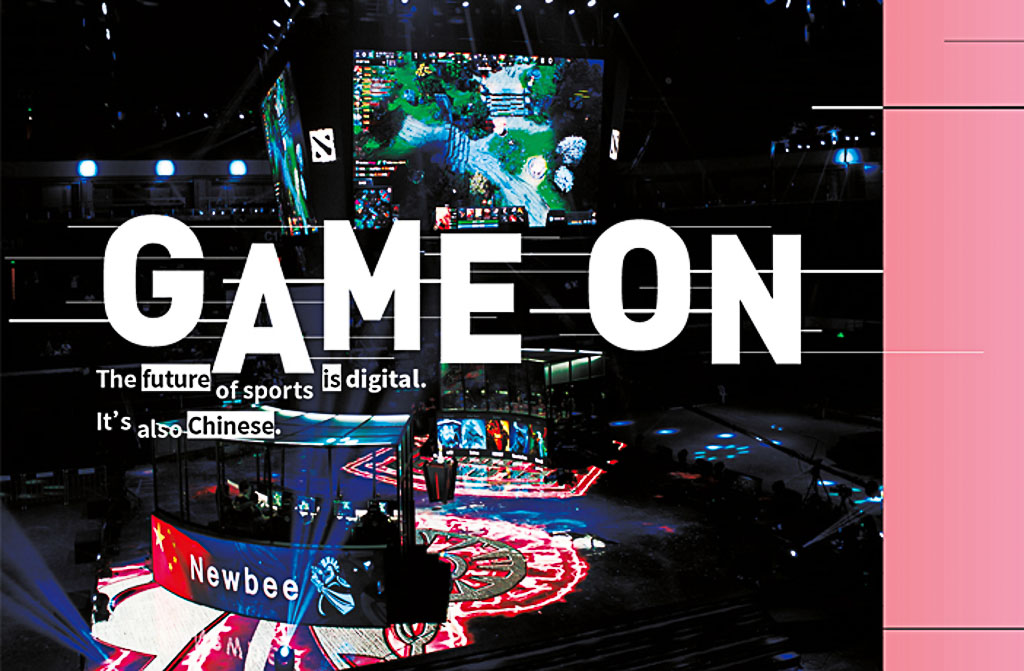





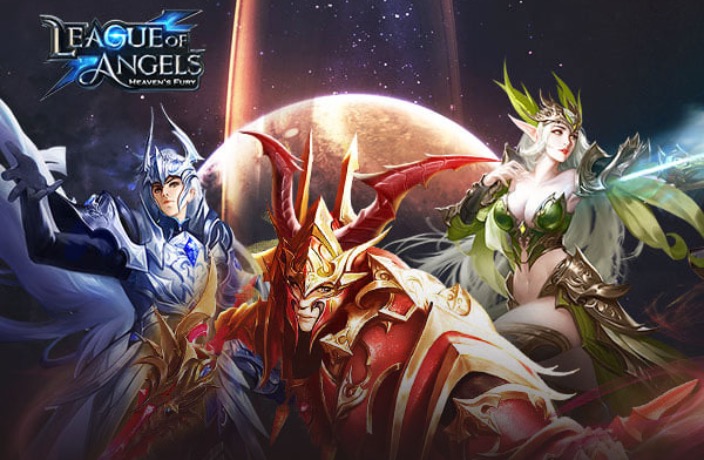
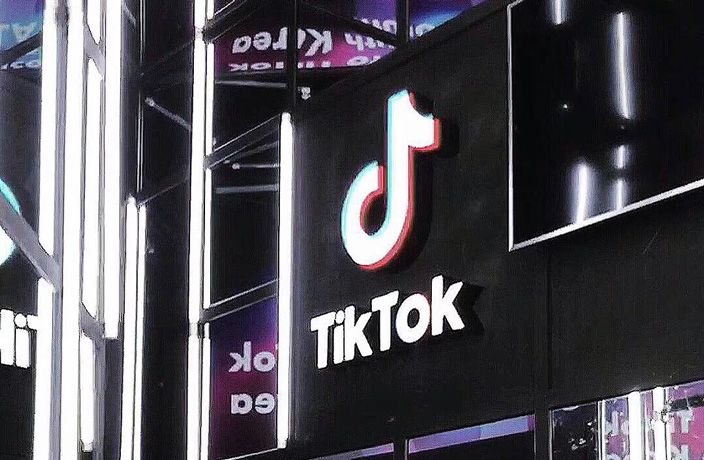














0 User Comments